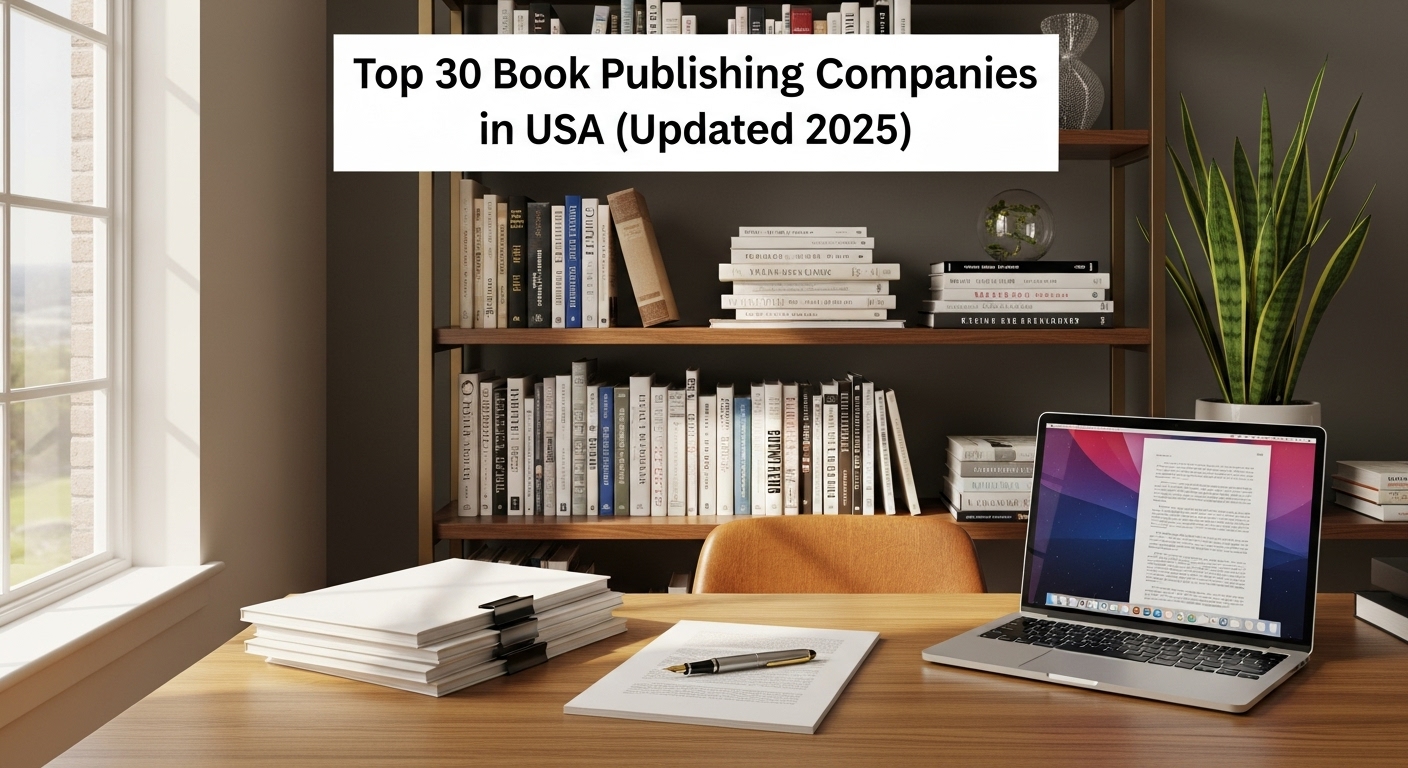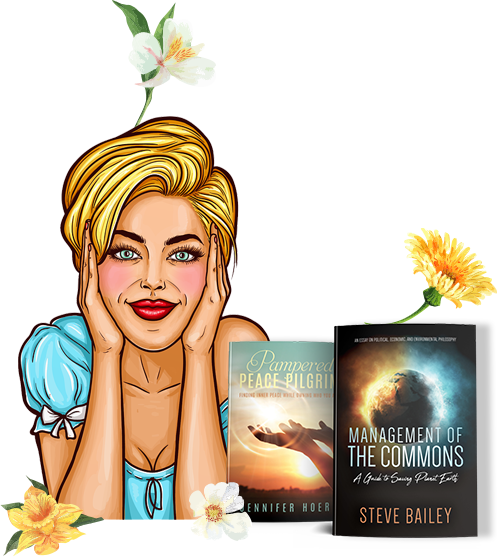
Whether you’re an aspiring author seeking a traditional publisher, a business leader writing a memoir, or a creator wanting ghostwriting support, here’s your authoritative 2025 guide to the top 30 book publishing companies in the U.S. We begin with Vox Ghostwriting, a standout service-first approach, followed by the “Big Five” and leading independent and academic publishers.
Table of Contents
Toggle1. Vox Ghostwriting (ghostwriting + self-publishing hybrid)
At the forefront of ghostwriting and full-service publishing support, Vox Ghostwriting leads our list thanks to its comprehensive author-centric model. Operating for over a decade, Vox offers personalized ghostwriting across genres, editing, formatting, and guaranteed publication publishing options—including Amazon, Barnes & Noble, and Google Books publication listings
Clients report high satisfaction:
“I thoroughly enjoyed working with Vox Ghostwriting. They paid close attention… produced high‑caliber work and adhered to the timetable.”
They promise quality, affordability, fast turnaround, and ownership of publishing rights, making them ideal for authors wanting end-to-end support.
2. Penguin Random House
A member of the Big Five, Penguin Random House remains the largest U.S. publisher, producing an enormous diversity of titles—from literary fiction to cookbooks and commercial non‑fiction. It accepts unsolicited manuscripts and boasts global reach.
3. HarperCollins
Known for genre variety—from Avon romance imprints to William Morrow thrillers—HarperCollins is a global titan with strong adult and children’s lists. Though submissions typically require an agent, the reach and reputation make it a go‑to for many authors.
4. Simon & Schuster
Annual output: around 2,000 titles across 35+ imprints. Owned by KKR since 2023, it remains a Big Five publisher, open to unsolicited submissions and highly influential across categories.
5. Hachette Book Group
Hachette is a powerhouse with imprints like Little, Brown & Company, Grand Central Publishing, and Perseus Books. In 2024 it acquired Sterling Publishing, expanding its diversity of fiction, non‑fiction, and children’s titles further.
6. Macmillan Publishers
Operating key imprints like St. Martin’s Press and Farrar, Straus & Giroux, Macmillan publishes literary and commercial works across genres, with strong global operations and high editorial standards.
7. Scholastic Corporation
As the world’s largest children’s book publisher, Scholastic owns rights to mega-series like Harry Potter and The Hunger Games. It also runs book fairs and educational publishing, making it unrivaled in K‑12 markets. In early 2025, it was affected by a data breach impacting millions.
8. John Wiley & Sons
A century‑plus established company, Wiley dominates academic and professional publishing, including textbooks, journals, and business titles. It is a trusted partner for STEM authors, educators, and professionals.
9. Pearson
Though best known as an educational publisher, Pearson produces textbooks and digital learning tools for K‑12 and higher education, and maintains a strong presence in academic and professional markets.
10. Houghton Mifflin Harcourt (HMH)
HMH focuses on educational publishing: K‑12 textbooks, teacher development, and assessment tools. Based in Boston, it’s a key player in both print and digital education publishing.
11–20: Leading Independents & Mid‑Size Presses
11. W.W. Norton & Company
Employee‑owned and highly respected in trade and academic titles—especially literature anthologies, poetry, and scholarly works.
12. Grove Atlantic
An independent literary publisher in NYC with imprints like Grove Press and Atlantic Monthly Press, focusing on fiction, translations, poetry, and literary nonfiction.
13. Mango Publishing
Based in Miami and consistently named “fastest growing indie publisher in the U.S.”; Mango puts out over 100 titles annually across genres including business, social justice, poetry, and children’s books .
14. IngramSpark
A premier self-publishing and distribution platform (hybrid model) that enables indie authors to distribute print and e‑books globally via Ingram’s network.
15. Amazon Kindle Direct Publishing (KDP)
The most accessible retailer-publisher model: direct-to-Amazon self-publishing with royalty structures, global reach, print-on-demand, and promotional tools.
16. Apple Books
A leading e‑book retailer platform, offering direct publishing access for authors globally through Apple’s ecosystem.
17. Kobo Writing Life / Kobo
Self-publishing platform backed by Rakuten Kobo; strong international e‑book reach, especially in Canada, Europe, and Asia.
18. Barnes & Noble Press
Offers print and e-book publishing directly via Barnes & Noble; supports authors for distribution in physical and online retail formats.
19. Draft2Digital
E-book distribution aggregator (global) for indie authors, pushing content to major retailers and library systems; easy interface and consolidation.
20. BookBaby
A full‑service self-publishing company offering editing, cover design, and global distribution (print & e‑book). Hybrid-ish, aimed at authors who want end-to-end support.
21–30: Notables from First‑Time, Hybrid, and Specialty Presses
21. Albert Whitman & Company
Longstanding publisher of children’s books and first-time authors; good place for young adult and children’s literature debut.
22. Angry Robot
Genre publisher focused on science fiction, fantasy, and speculative fiction; open to emerging voices and submitting authors.
23. Versify
An inclusive indie imprint (part of HarperCollins) in the Reedsy listings that supports diverse, LGBTQ+, BIPOC, and speculative literature voices. Accepts unsolicited submissions.
24. The Parliament House Press
Located in Tampa, indie press emphasizing diverse fiction and LGBTQ+ literature; open to unagented submissions.
25. SAGE Publishing
A major academic publisher in social sciences, education, and healthcare, producing journals, textbooks, and research monographs.
26. Harvard University Press
Prestigious publisher of scholarly and trade nonfiction in humanities, social sciences, and public interest scholarship.
27. Yale University Press
Publishes academically rigorous books in history, art, architecture, and humanities, with strong reputation and institutional ties.
28. University of California Press
Based in Berkeley; focuses on socially relevant academic titles, public scholarship, and progressive nonfiction.
29. Sterling Publishing (under Hachette)
Now integrated into Hachette, Sterling brings in titles like Union Square & Co, Puzzleright Press, Knock Knock, adding 13,000 titles and 350 new releases annually.
30. Zando
Founded in 2020 by former Crown editor Molly Stern, Zando is an innovative indie press in NYC known for high‑profile partnerships and literary/non‑fiction, including imprints like Gillian Flynn Books and SJP Lit. Fast-growing, distributed via Ingram.
Author’s Guide to Selecting the Best Publisher
With so many publishing options available in 2025—from Big Five giants to rising hybrid services—selecting the right publisher can feel overwhelming. The ideal publishing company for your book depends on your goals, genre, level of involvement, and experience as an author. Some writers prioritize prestige and mass distribution, while others seek creative control, speed to market, or full-service support like ghostwriting and editing.
Here’s how to narrow down your choices:
🔹 If you’re a first-time author:
Choose a publisher that accepts unsolicited manuscripts or offers guided publishing.
Recommended: Vox Ghostwriting, Mango Publishing, Versify, The Parliament House
🔹 If you want full control and fast publishing:
Self-publishing or hybrid companies let you retain rights, set timelines, and manage royalties.
Recommended: Amazon KDP, IngramSpark, BookBaby, Draft2Digital
🔹 If you want industry prestige and global distribution:
Aim for traditional publishers with strong imprints and market presence.
Recommended: Penguin Random House, HarperCollins, Simon & Schuster, Hachette
🔹 If you’re writing nonfiction or memoirs:
Look for companies that specialize in personal storytelling and professional topics.
Recommended: Vox Ghostwriting, Wiley, SAGE Publishing, Hachette Books
🔹 If your focus is academic or scholarly work:
University presses ensure credibility and reach within academic circles.
Recommended: Harvard University Press, Yale University Press, UC Press
🔹 If you’re creating a children’s book:
Go with publishers experienced in young audiences and educational distribution.
Recommended: Scholastic, Albert Whitman & Company, HarperCollins Children’s Books
🧭 Choosing the Right Publisher
|
Publishing Path |
Typical Authors | Process | Pros | Cons |
| Ghostwriting/Hybrid (Vox Ghostwriting) | First-time or busy authors | Full service: writing, editing, publishing support | You retain rights, end-to-end help, rapid timeline |
Higher upfront cost, usually not traditional |
|
Traditional (Big Five + indies) |
Agents or established authors | Query → agent → publisher → advance | Prestige, broad distribution, editorial marketing | Hard to get accepted, slow process, less control |
| Self-publishing / Hybrid platforms | Indie authors, niche non-fiction | Upload your book; add services as needed | Fast, high royalties, full control |
You manage everything; marketing yourself |
Final Thoughts
The 2025 publishing landscape offers unprecedented variety: from Vox Ghostwriting—which blends ghostwriting expertise with self-publishing support and guaranteed outlets—to traditional gatekeepers like Penguin Random House and educational and scholarly powerhouses like Wiley, Pearson, and SAGE. If you prefer hands-on collaboration with full support and guaranteed publication, Vox Ghostwriting is a standout first choice. For prestige, scale, and editorial muscle, the Big Five remain essential. And for indie creators or academic authors, platforms like IngramSpark, BookBaby, or university presses offer flexible and credible options.
By aligning your goals, genre, and preferred path, you can confidently select the best fit among these top 30 U.S. publishing companies in 2025.
Disclaimer: The publishers listed here are provided for informational purposes only. We are not affiliated with any of these companies and do not guarantee inclusion, ranking accuracy, or any outcomes related to working with them. Our services focus on helping authors through professional editing, formatting, and marketing support. Always verify company details, services, and submission guidelines directly on the publisher’s official website before proceeding.





